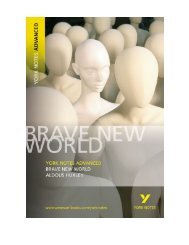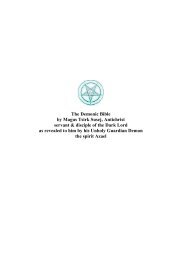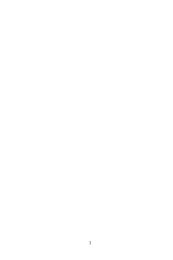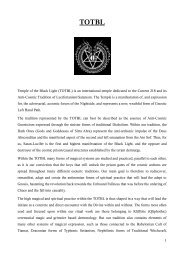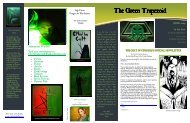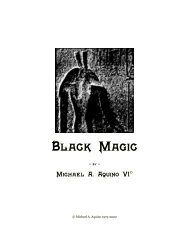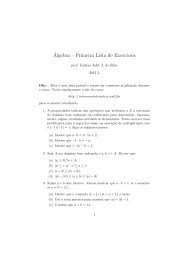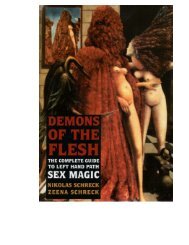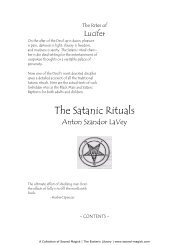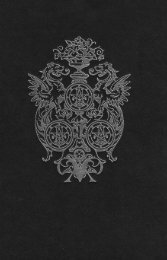Satanism Today - An Encyclopedia of Religion, Folklore and Popular ...
Satanism Today - An Encyclopedia of Religion, Folklore and Popular ...
Satanism Today - An Encyclopedia of Religion, Folklore and Popular ...
Create successful ePaper yourself
Turn your PDF publications into a flip-book with our unique Google optimized e-Paper software.
Appendix I: Sample Documents 297<br />
they are bombarded with it.<br />
Many <strong>of</strong> us found the school playground to be a<br />
painful battlefield, not because <strong>of</strong> drugs or guns but<br />
because we hated interacting with other kids. Satanic<br />
children are naturally set upon by other children,<br />
<strong>and</strong> by insecure teachers. They are bound to be<br />
brighter <strong>and</strong> more aggressive toward the status quo<br />
by nature, because that’s what they’ll be learning at<br />
home from their Satanic parents. That’s what being a<br />
Satanist is. <strong>An</strong>d our children shouldn’t have to suffer<br />
for asking uncomfortable questions.<br />
8. Much <strong>of</strong> homeschooling is religiously motivated,<br />
<strong>and</strong> ours is really none the less so, in the sense<br />
that our religion dictates our priorities <strong>and</strong> values.<br />
Many Mormons have been trying to educate their<br />
children at home for years, some dying in gun battles<br />
because <strong>of</strong> it. Catholics started their own system <strong>of</strong><br />
private schools instead <strong>of</strong> allowing their children to<br />
be exposed to ideas without Papal approval. Modern<br />
born-again Christians want to keep their kids away<br />
from a liberal, humanist, evolutionist agenda.<br />
Unlike others, however, <strong>Satanism</strong> is a religion<br />
uniquely qualified to advocate home learning. Our<br />
religion is not antithetical to rationality. On the<br />
contrary, <strong>Satanism</strong> encourages intellectual challenge.<br />
“Faith” <strong>and</strong> self-deceit are our enemies. We want our<br />
children to be free to question all things, not shackle<br />
their minds to any one view. Concerned non-<br />
Satanists who learn about our religion only through<br />
talk-show hype, who would fear we would “indoctrinate”<br />
our children to <strong>Satanism</strong>, have less to worry<br />
about with us than with Christianity. Since our religion<br />
isn’t dependent on dogma <strong>and</strong> blind faith, no<br />
indoctrination is necessary. Our attitudes about life,<br />
animals, magic, success, Satan, science will inevitably<br />
seep in, through our opinions <strong>and</strong> example. A child<br />
should be free to explore anything he’s drawn to.<br />
Even Christianity can be examined as the dominant<br />
mythic context—cultural anthropology in action!<br />
Whose Kids Are These, <strong>An</strong>yway<br />
You’d think the right to educate your own children<br />
would be a basic, inalienable one. But it’s not. <strong>An</strong>y<br />
empowerment <strong>of</strong> individuals is hotly resisted by<br />
teachers’ unions <strong>and</strong> the gr<strong>and</strong> bureaucracy that<br />
depends on m<strong>and</strong>atory education. That’s why such<br />
groups lobby for prohibition or severe restriction <strong>of</strong><br />
homeschooling: It would lower their “ADA” (Average<br />
Daily Attendance). Fewer students in school—fewer<br />
teachers hired. Besides, in today’s climate <strong>of</strong> pr<strong>of</strong>essional<br />
experts in all fields, we are programmed to feel<br />
incapable <strong>of</strong> teaching our own children. “They” say<br />
you can’t possibly be qualified to teach your own children,<br />
<strong>and</strong> we’re trained to believe them. Such important<br />
matters should be left to “experts.” At the same<br />
time, legislators, reacting to dem<strong>and</strong>s from their<br />
constituencies to improve education, have enacted<br />
stricter national st<strong>and</strong>ardization tests in public<br />
schools. That trickles down to imposing similar<br />
dem<strong>and</strong>s on homeschooling families, which undermines<br />
their most positive strength—being able to<br />
gauge the pacing <strong>and</strong> content <strong>of</strong> studies to each individual<br />
child. Some homeschoolers feel a legitimate<br />
responsibility to keep their fingers on the political<br />
pulse, sounding the alarm if they perceive negative<br />
trends. Homeschooling today is not, in most states,<br />
the illegal activity it was 10 years ago. Laws vary from<br />
state to state, with different requirements for periodic<br />
tests, curriculum submissions, certifications, <strong>and</strong><br />
various other paperwork. But at best, home learning<br />
is tolerated as an unorthodox alternative.<br />
No one has reliable statistics on exactly how<br />
many homeschooling families there are; that’s the<br />
way they want it. But it’s clear that the level <strong>of</strong> public<br />
education has reached such a nadir that many intelligent<br />
people are opting for homeschooling now only<br />
because the average parents begin to suspect their<br />
children would learn more just by staying home <strong>and</strong><br />
reading or watching television. It’s become an<br />
increasingly important plank in the Religious Right<br />
political platform. Gordon Liddy has advocated it on<br />
his syndicated radio show. The home PC has opened<br />
worlds <strong>of</strong> learning possibilities for Everyman.<br />
Learning CDs, textbooks, entire mail-order curriculums<br />
are now available from publishers recognizing<br />
a burgeoning homeschooling market, making it a<br />
more accessible option than ever before.<br />
The current homeschooling explosion could<br />
create some strange bedfellows. Not all homeschoolers<br />
are Christian but they are a strong faction, along<br />
with an articulate backbone <strong>of</strong> politically avid atheistic/humanistic<br />
iconoclasts. This latter influence has<br />
a heritage in the educational libertines who started<br />
several “alternative” colleges <strong>and</strong> schools in the wake<br />
<strong>of</strong> the 60’s. Many <strong>of</strong> these were based on nonconformist<br />
ideas about self-initiated or studentcentered<br />
learning, written evaluations instead <strong>of</strong><br />
grades,“co-learners” instead <strong>of</strong> “teachers,” an emphasis<br />
on process over product, “schools without walls”<br />
(i.e., learning in the community) <strong>and</strong> “learning how<br />
to learn.” They are largely atheistic or humanistic <strong>and</strong><br />
have the same kind <strong>of</strong> disdain for education factories<br />
that we do.<br />
It seems that the secular <strong>and</strong> Christian homeschooling<br />
factions have been able to set religion <strong>and</strong><br />
politics aside, working toward preserving their children’s<br />
rights to learn. A tenor <strong>of</strong> mutually beneficial<br />
separatism seems to pervade most home learning<br />
literature. Most have also tried not to develop a dictatorship<br />
within the homeschooling movement; there<br />
is no “right” way or one absolute authority. They<br />
recognize the strength <strong>of</strong> homeschooling is in the



